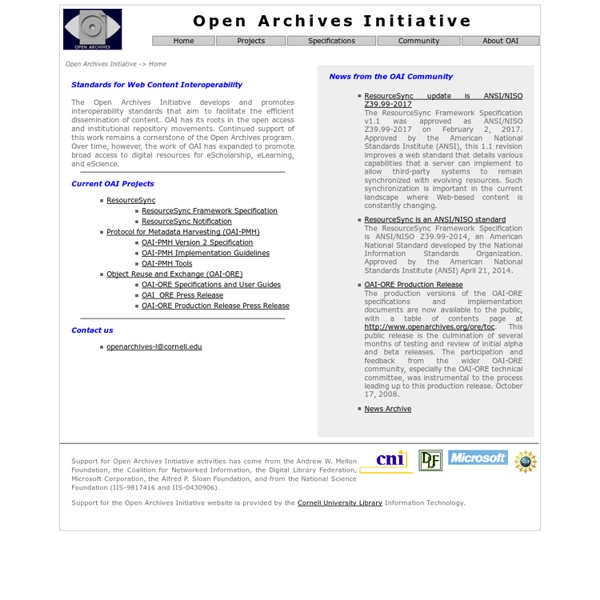



The Art of Equalization The Art of Equalization by Ethan Winer (This article first appeared in the August 1979 issue of Popular Electronics magazine.) A growing number of audio enthusiasts are using equalizers to adjust their stereo system's frequency response, whether to compensate for room acoustics or for creative recording purposes. Open Repositories Repositories increasingly play a pivotal role in the emerging information landscape. Through a format that blends open user group meetings for DSpace, Fedora, and Eprints, followed by general conference sessions that cover cross-cutting and overarching issues, Open Repositories attempts to create opportunities to explore the challenges faced by user communities and others in today’s world. The many repository platforms available today are changing the nature of scholarly communication. Institutions such as universities, research laboratories, publishers, libraries, and commercial organizations are creating innovative repository-based systems that address the entire lifecycle of information — from supporting the creation and management of digital content, to enabling use, re-use, and interconnection of information, to ultimately ensuring long-term preservation and archiving. The OR2013 conference theme was Use, Reuse, Reproduce. Visit the conference website to learn more.
The Implementation of the Berlin Declaration on Open Access : Report on the Berlin 3 Meeting Held 28 February—1 March 2005, Southampton, UK Open Access (OA) means immediate, permanent, free online access to the full text of all refereed research journal articles (2.5 million articles a year, published in 24,000 refereed journals, across all disciplines, languages and nations). The Berlin Declaration on Open Access < launched in October 2003, has so far been signed by 55 institutions globally, including large national research institutions such as France's CNRS and Germany's Max-Planck Institutes; national Academies of Science such as those of China, India and the Netherlands; international research institutions such as CERN; and individual universities and research funding agencies around the world. To sign the Berlin Declaration is to declare one's institution to be in favor of the abstract principle of OA, but until now it did not indicate a commitment to actually providing OA, nor did the Declaration specify the concrete steps an institution should take in order to do so. Dr. The US was under-represented at Berlin 3. and
Facial Action Coding System Muscles of head and neck. Facial Action Coding System (FACS) is a system to taxonomize human facial movements by their appearance on the face, based on a system originally developed by a Swedish anatomist named Carl-Herman Hjortsjö.[1] It was later adopted by Paul Ekman and Wallace V. Friesen, and published in 1978.[2] Ekman, Friesen, and Joseph C. Hager published a significant update to FACS in 2002.[3] Movements of individual facial muscles are encoded by FACS from slight different instant changes in facial appearance.[4] It is a common standard to systematically categorize the physical expression of emotions, and it has proven useful to psychologists and to animators.
Open Repository Blog : ALA Midwinter 2012 BioMed Central’s Open Repository recently exhibited at the ALA Midwinter Conference in Dallas. Warm and sunny, it was a great change of scenery with excellent food! In a climate of stretched budgets, attendance at the conference seemed low. However it was great that our representatives: Bob Schatz and Nish Thiru were kept very busy at the booth. Advaita Vedanta Advaita Vedanta[note 1] is a sub-school of the Vedanta[note 2] school of Vedic or Hindu philosophy[5] and religious practice,[web 1] giving "a unifying interpretation of the whole body of Upanishads". The principal, though not the first, exponent of the Advaita Vedanta-interpretation was Shankara Bhagavadpada who systematised the works of preceding philosophers. Its teachings have influenced various sects of Hinduism. The key source texts for all schools of Vedānta are the Prasthanatrayi, the canonical texts consisting of the Upanishads, the Bhagavad Gita and the Brahma Sutras, of which they give a philosophical interpretation and elucidation. Advaita developed in a multi-faceted religious and philosophical landscape. The tradition developed in interaction with the other traditions of India, Buddhism, Vaishnavism and Shaivism, as well as the other schools of Vedanta.
Beginners Guide to Social Media for OR2012 » Open Repositories 2012 As the conference approaches, we’ve been doing everything we can to get ready – getting our words-per-minute up, building up a tolerance to caffeine, and getting you all excited. One of the things we really want out of OR2012 is a good conversation. That means networking in person, and using this internet thing – we hear it’s sticking around. We’ll be using several different tools during OR2012 and we want to make sure that everyone’s familiar with them so you’ll find a guide here to using Crowdvine; Twitter; Lanyrd; Flickr; and Live blogging - click “Read More” below to browse through all of our tips or click on the one you are most interested in.
Smarta Tradition Smartha Sampradaya (Sanskrit, meaning Smartha Tradition) is an orthodox[web 1] Hindu "family tradition"[web 2] or sect composed of Brahmins, c.q. "[a] certain category of brahmins",[web 2] which follows Shanmata. The term Smārtha is used to denote a specific, specialized category of Brahmins, who specialize in the smriti,[web 2] c.q. who hold the smriti as the most authoritative texts. Generally Smartas worship the Supreme in one of five forms: Ganesha, Siva, Sakti, Vishnu, and Surya. Because they accept all the major Hindu Gods, they are known as liberal or nonsectarian.
"The Open Archives Initiative develops and promotes interoperability standards that aim to facilitate the efficient dissemination of content. The Open Archives Initiative has its roots in an effort to enhance access to e-print archives as a means of increasing the availability of scholarly communication" by macopa May 23